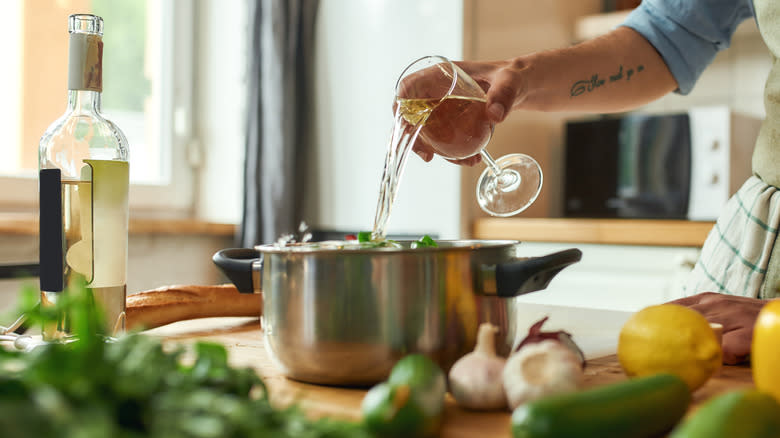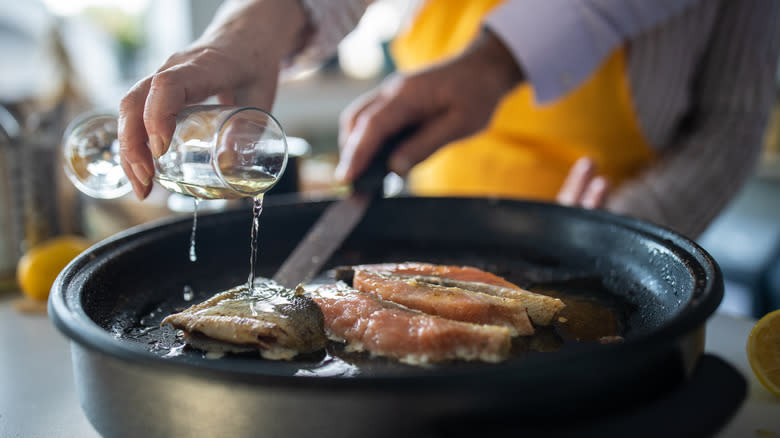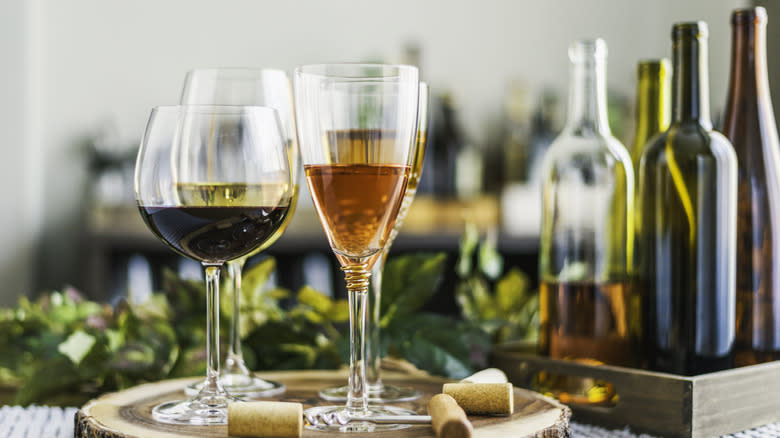What To Consider When Choosing Wine To Cook With, According To An Expert

Using wine as a cooking ingredient can transform a meal from ordinary to extraordinary; however, there are tips you need to consider when cooking with wine, such as which wine to choose. We spoke to Kieron Hales, chef and co-owner of Zingerman's Cornman Farms, and asked him how the quality of the wine plays a factor when we're cooking with it.
Hales explained, "The quality of any ingredient in a sauce plays a large part, and the wine is no exception." He elaborated, "The better the wine, usually with some age, the reduced tannins, thus creating a much better mouthfeel of the sauce." Wine with higher levels of tannins tend to taste more bitter or astringent, and those flavors get infused into your food. Tannins also cause sauces to have a harsher texture and less pleasant mouthfeel. "In general, we want lower tannins for a sauce, but there are some exceptions, such as a fatty meat dish. Use a high-tannin wine with caution, as too high a level of tannins can make the sauce become bitter," Hales told us.
Understandably, better wines usually mean a higher price point. Does this mean we must cook with the most expensive red or white wines to get the best result? Hales doesn't think so. "While I would not recommend a $200+ wine being used for a sauce, I would always plan on using a wine you would love to drink," he stated.
Read more: 13 Liquors Your Home Bar Should Have
Always Cook With The Wine You Wish To Drink That Night

Whenever you're stumped on which wine to cook with, Kieron Hales wants you to first pick out the wine you wish to drink, which should dictate what you'll be cooking. He stated, "I like to cook with the same wine I intend to drink with the dish I am serving the sauce with." So, let's say you're craving a good red wine to enjoy tonight; pick out your favorite bottle of red and use that to cook a dish with it, such as our sous vide red wine poached pears recipe. You can also use your favorite red wine for your next pasta night. And, if you're looking for a high-quality red wine and don't know where to start, we've compiled a list of the 13 best red wines for cooking.
On the other hand, if you want to enjoy white wine with your dinner, consider making our buttery lobster spaghetti with white wine-tomato sauce recipe. Then, enjoy the same white wine with your delicious home-cooked meal. Beyond the varietal of the wine, there are other factors to consider when picking a wine for cooking. For instance, if you're making a hearty dish with a heavier sauce, Hales told us, "The body of the wine should be heavy as well."
Why An Expert Thinks You Should Never Cook With Cooking Wine

Another point Keiron Hales wants you to consider is never picking a cooking wine when you have access to better options. He suggested, "Avoid 'cooking wines.' These are not what you want to use, with high tannin levels and basic flavor. You are best served with a good mid-range wine you enjoy drinking. I'd recommend finding a local wine store where you can talk about and taste options."
Cooking wines often lack the complexity and nuanced flavors of the wines you drink and can also add unwanted sodium to your dish. Fermented cooking wines (like mirin made from rice) can impart subtle sweetness and hints of umami to your dishes. Mirin is the secret ingredient your fried rice might be missing, but you can follow Hales' advice and stick to cooking with drinking wines in most cases. On taste preferences, Hales stated, "For me personally, I love a bit of sweetness in a wine to enhance the sauce. This is not for everyone, a dry wine is usually preferred for savory dishes, but sweet is the way for me."
A Wine's Flavor And Finish Can Impact Your Dish

In addition to a wine's sweetness level, Kieron Hales wants you to consider its acidity level. He explained, "Higher acidity can add to the brightness and lift to a sauce ... I love a cream sauce, and this helps cut through, so it isn't overly rich." For example, while white wine is all you need to give Jarred Alfredo sauce a flavor boost, you may want to choose white wine with a higher acidity level to slice through the sauce's richness.
It is also important to consider the alcohol content of a wine. "While this does cook off during the process, starting with too high a proofed wine can result in a harsh taste for a sauce. I prefer a low to medium alcohol content, ideally 14% ABV or below," Hales elaborated. Additionally, you should note how the wine is finished. "If the wine is finished in oak, you get a toasty vanilla flavor that makes it complex or sweet, whereas stainless steel is much simpler and cleaner with berry flavors," Hales added.
Hales has certainly given us a lot to think about; however, he wished to reiterate how one factor about the wine you choose to cook with can outweigh the rest. Hales enthused, "As a chef, we cook for others, however when cooking for myself or family, I make different very personal choices for my palate and food journey. Try the wine. Like the wine. Use the wine."
Read the original article on Tasting Table

